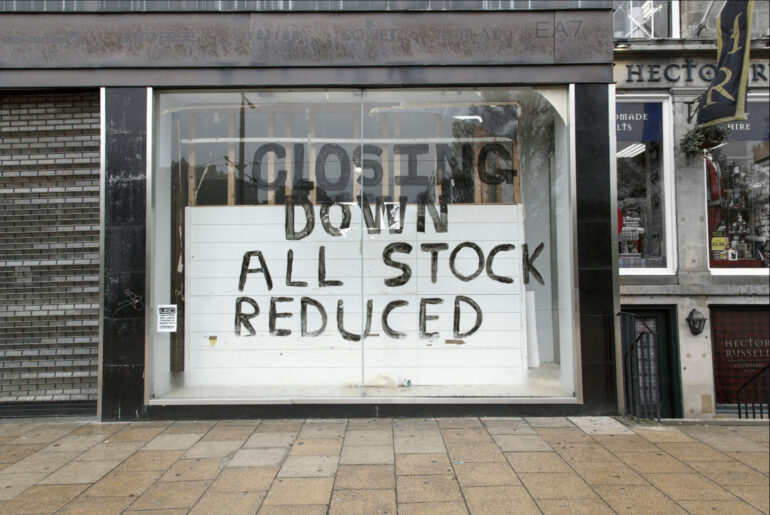Data released today by The Insolvency Service has revealed a notable increase in financial distress within the UK business sector.
In October 2023, registered company insolvencies were 18% higher compared to the same month in the previous year.
Additionally, there was a significant 71% rise in the number of Debt Relief Orders (DROs) during the same period.
Industry experts have expressed concerns about these trends. Alastair Hoyne, chief executive officer at Finanze, said: “Company debt is rising and the ability to service it has decreased. Businesses and their owners are still reeling from the impact of Covid.
“The ‘cheap’ extra money pumped in by the Government to keep firms afloat through schemes such as Bounce Back Loans must now feel like a deadweight to many business owners, slowly dragging them under.”
While Justin Moy, managing director at EHF Mortgages reflected on the implications of the increase in DROs, stating: “The huge 71% increase in DROs shows how many borrowers are having to reach out for formal help and support where previously they may have been treading water servicing their debt with lower interest rates.”
Further reaction
John Lamerton, small business author at Big Ideas… for Small Businesses:
“Small businesses are dying, and it’s not hard to see why: rising costs, a tough economy and taxes that are higher than ever before. Small firms are dropping like flies, and if we’re not careful, we’ll lose our reputation as a once-famous nation of shopkeepers.”
Ian Hepworth, director at Funding Solutions UK Limited:
“With ballooning interest costs and lenders unwilling to restructure funding, this increase in company insolvencies comes as no surprise. Businesses have struggled since lockdown and since then have had to overcome challenges with inflation and supply chain disruptions. Borrowing was a potential solution and now prolonged high interest rates have simply compounded the issue. It’s beyond bleak for many businesses right now.”
Gary Bush, financial adviser at MortgageShop.com:
“Though perhaps inevitable due to the cost of living crisis and higher borrowing costs that households are suffering, such a sharp increase in Debt Relief Orders (DROs) in October 2023 is frightening.
“Company Insolvencies being 18% higher is also a worrying sign for the UK as is the increase in Company Voluntary Arrangements. With a dramatic increase in administrations, the Government and Bank of England need to take a long hard look at these figures and find a way to support the UK’s struggling households and businesses.”
Darryl Dhoffer, mortgage expert at The Mortgage Expert:
“The number of individual insolvencies decreasing compared to the previous year indicates a slight improvement in financial well-being among consumers. However, the sharp increase in debt relief orders (DROs) suggests that a growing number of individuals are struggling with debt and resorting to formal debt relief measures, which could be related to rising inflation, increased living costs and higher interest rates.
“The rise in company insolvencies indicates an extremely challenging business environment, with rising interest rates, high inflation and supply chain disruptions big contributors.
“The outlook is that both individuals and businesses are facing continued hardship, which does not look like letting up anytime soon. In the meantime, the Government merely look on.”
Ranald Mitchell, director at Charwin Private Clients:
“Company insolvencies have been steadily rising since the end of Lockdown. No doubt the effects of the pandemic affected this and the current challenging economic environment is continuing to punish many businesses. Better news on individual insolvencies though, 6% lower than October 2022 with people seeking to enter IVAs down 27%. With economic pressures easing up, those remaining businesses may just have weathered the worst of the storm.”
Simon Bridgland, broker/director at Release Freedom:
“It comes as no surprise that these numbers have in the main gone up. The same pressures people are feeling on their household budgets are also being felt in business. However in business, unless they have punters through the door they have zero income to pay the bills. We need to spare a thought or two for the business owners, the entrepreneurs and risk-takers who are being hit with successive blows.
“They would not have chosen to have a failed business. Often they lose it all at such a time. Many get no financial support and are then tarred with the failure brush, struggling to build things again, get credit, employ others, and support communities. One of the failings of the credit system is how it treats those who have had businesses go bust. Many company failures in recent years were due to things totally out of the owners’ control.”
Samuel Mather-Holgate, independent financial advisor at Mather and Murray Financial:
“The legacy of Sunak won’t be halving inflation, it will be the pain and suffering he and Andrew Bailey have inflicted on British households. The amount of people and businesses unable to cope with rising levels of debt and higher interest is yet to be seen, but these figures indicate how rapidly things are turning bad.”



